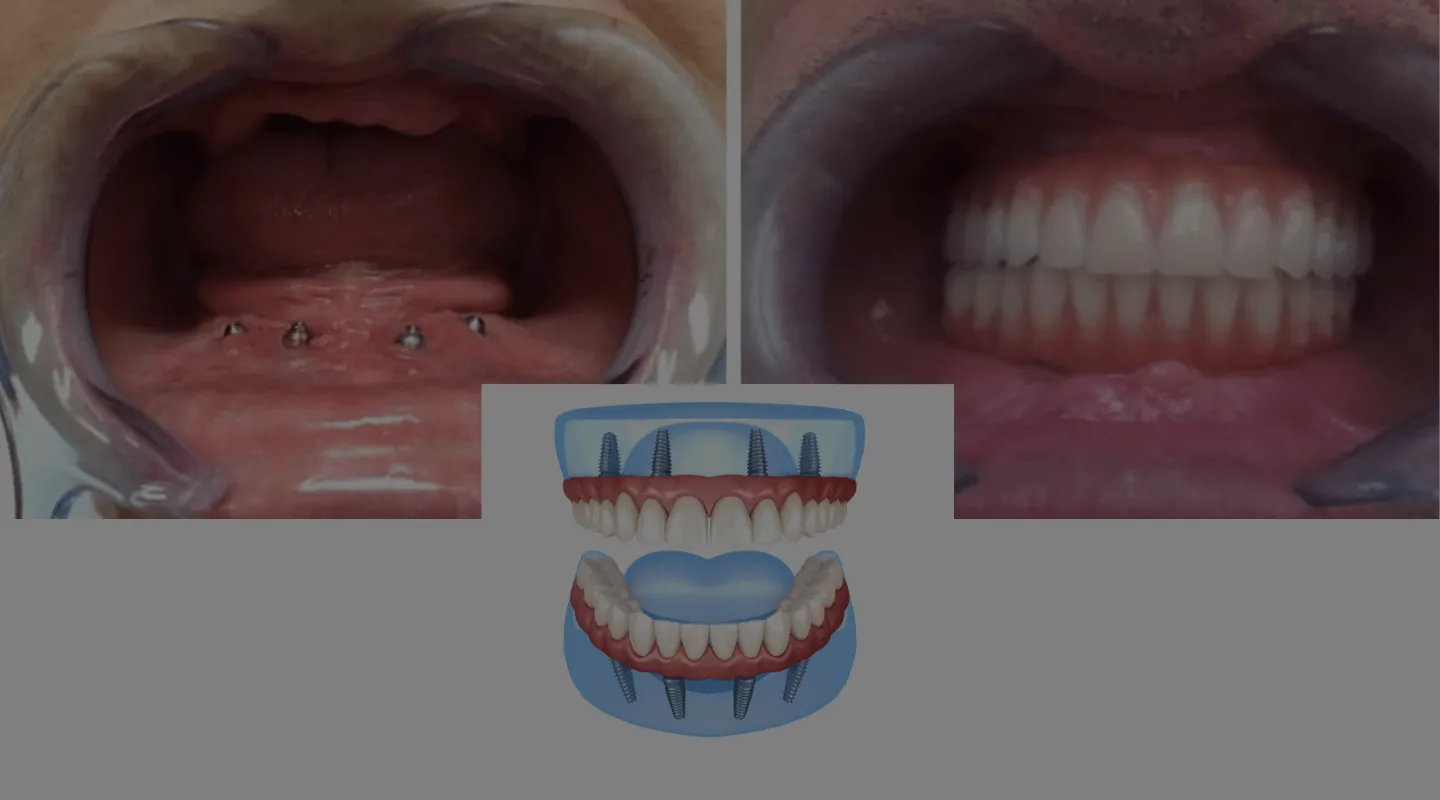
All on 4
Your All on 4 in Tunisia at an affordable price
Opt for a medical stay with Tunisia Destination Santé and take advantage of the expertise of our specialist doctors and the best healthcare facilities in Tunisia. Thanks to our tailor-made service, you will benefit from comprehensive support in a secure and comfortable setting.
How does it work?
What are All-On-4 dental implants?
All-on-4 dental implants are a full set of teeth resting on 4 dental implants. The four titanium implants support a fixed prosthesis of 10 to 14 teeth. Once in place, your replacement teeth will offer an appearance, feel, and chewing ability similar to that of your natural teeth. This treatment is very popular because the prosthesis is inserted immediately, allowing patients to immediately replace their missing teeth. Unlike removable dentures, All-On-4 dental implants are a permanent solution for a more natural-looking smile. “All-On-4” allows you to replace your denture immediately, without the lengthy procedure of conventional implants.
How much do All-on-Four dental implants cost in Tunisia?
The price of All-On-4 dental implants can vary depending on several factors such as the material used and the number of teeth to be replaced. In Tunisia, the cost of All-On-4 implants includes all the fees for the procedure, such as various consultations, surgical procedures, placement of an acrylic prosthesis, post-treatment examinations, and X-rays. The price does not include preparatory care for an all-on-four, such as a bone graft or sinus lift.
Your health, our priority.
Request your free quote.
How is the All-On-4 dental implant procedure performed?
After extraction of existing teeth and preparation for the All-On-4 procedure, the 4 implants are placed in the patient’s jaw. Once placed, the implants gradually adhere to your jawbone through a process called osseointegration. A temporary bridge will then be placed. An acrylic bridge will be preferred. This bridge is more forgiving on the bite. It can absorb some of the bite impact, which promotes osseointegration. Due to its high rigidity, a zirconia bridge absorbs less of the biting force and could hinder the healing process.
All-on-4 prosthesis: Once the healing process is complete, i.e. 3 to 6 months after the placement of the 4 implants, a zirconia dental prosthesis with 10 to 14 teeth will be fixed onto the 4 implants. Some patients choose to have an initial fixed acrylic bridge installed. This fixed bridge lasts up to 5 years before needing to be replaced. Many patients choose to replace the initial fixed bridge with a near-definitive solution with a zirconia or porcelain bridge.
Can I get All-On-4 dental implants in Tunisia?
All-On-4 dental implants represent a lifetime investment. It is therefore important to consult an excellent dentist who offers an exceptional level of care. It is also important to have a reliable long-term dental solution for your dental treatment. Poorly placed implants can lead to other costly dental treatments. By visiting our implantology specialist dentist, qualified in the United States, you are assured of receiving quality care. The primary advantage of getting All-on-Four abroad is the price. The price can be up to 80% less than the prices charged in some European countries and the United States. However, be aware that sometimes reduced prices are not accompanied by the use of quality materials. Poor quality materials can cause infections. It can also cause complications that result in the removal of one or more implants. The medical team at Tunisia Destination Santé uses exclusively internationally-standardized materials of European and North American origin. Be sure to choose your dentist carefully before committing. Request the dentist’s CV. For the all-on-four technique, you will need to travel to Tunisia twice. During the first stay, the dentist will place the 4 implants after validating the procedure following the clinical examination. The temporary bridge will also be fixed during this first trip. A stay of 4 to 5 working days should be planned. During the second stay, planned 3 to 6 months later, the final bridge will be placed.
Who is a good candidate for All-On-4?
Patients with several missing teeth, broken teeth, or teeth severely affected by gum disease are often good candidates for All-On-4 treatment. The all-on-4 technique can be used on patients who would not normally be eligible for dental implants due to diabetes, osteoporosis, or other health problems. Patients whose bone density does not allow for several dental implants can also be very good candidates for All-on-Four. Unlike dental implant placement, this technique avoids patients undergoing expensive and invasive bone grafting. They also do not need to undergo lengthy grafting surgery before All-on-Four treatment, except in exceptional cases. If you still have several teeth or only need one implant, this may not be the optimal solution for you. There are various options for replacing natural teeth, such as a dental bridge, a partial denture, or an individual dental implant.
What is the All-on-Four recovery time?
The recovery time for the All-On-4 procedure can vary depending on the patient, but as a general rule, it takes 2 to 3 weeks for a complete recovery. The first few days following the procedure may be accompanied by pain and some discomfort in the gums and mouth. To relieve these sensations, analgesic medication may be prescribed. To ensure a quick and successful recovery after the All-on-Four procedure, it is essential to pay attention to your diet. During this period, it is essential to avoid hard and sticky foods to preserve the dental implants. In addition, it is recommended to limit your consumption of cigarettes and alcohol, as this can hinder healing and delay recovery. By carefully following the dentist’s instructions, patients can ensure an efficient and worry-free recovery.
All on 4 recovery time
The recovery time after an All-on-4 procedure, a dental rehabilitation technique that allows the replacement of all the upper or lower teeth with only four implants, varies depending on each patient and the complexity of the procedure. Immediately after the procedure, patients may experience some discomfort and swelling, which are generally well-managed with analgesics prescribed by the dentist. The first few postoperative days are crucial for following care recommendations, including a soft diet and appropriate oral hygiene to promote healing.
Most patients can return to their normal activities after about one to two weeks, although full comfort and optimal function may take several weeks to stabilize. During this time, adjustments may be needed to refine the temporary dentures. The implants themselves generally take several months to fully integrate into the bone, a process called osseointegration, before the final prostheses can be permanently fixed.
Is All-On-4 a safe solution?
All-On-4 is undoubtedly a safe and effective solution for replacing multiple missing or damaged teeth. The dental implants used in this procedure are made from biocompatible materials such as titanium, a substance that is very well tolerated by the human body. The success rate of this procedure is exceptionally high, with studies showing positive long-term results of up to 98%. However, as with any surgical procedure, potential risks such as infection, inflammation, or implant rejection remain. To guarantee the success of your procedure, it is essential to select a highly qualified and experienced dentist. In addition, it is essential to scrupulously follow postoperative instructions to minimize any potential complications. It is also important to note that patients with underlying medical conditions such as diabetes or hypertension may require closer medical monitoring before and after the procedure. In short, All-on-Four treatment is a safe and effective solution for patients seeking to restore optimal dental function and improved aesthetics.
Alternative treatments to All on 4
Alternative treatments to the All-on-4 method include several options depending on the needs and preferences of the patients. Dental implants, for example, consist of replacing one or more missing teeth with individual implants integrated into the jawbone. This solution is ideal for patients who retain adequate bone structure and wish to replace specific teeth rather than the entire arch.
Dental veneers are another alternative, especially for patients seeking to improve the appearance of their natural teeth. These thin ceramic or composite shells are bonded to the surface of the teeth to correct aesthetic imperfections such as chipped, discolored, or misaligned teeth, without replacing the teeth in an invasive way.
The Hollywood smile, on the other hand, is a more comprehensive aesthetic approach aimed at transforming the smile using a combination of dental treatments, including veneers, whitening, and sometimes crowns. This method focuses on improving the appearance of the smile as a whole, offering a visual transformation that may include eliminating dental irregularities and optimizing the harmony of the smile.
Are there any risks or side effects with All-on-Four?
Although the All-On-4 procedure is known to be a safe and effective solution for replacing multiple missing teeth, it nevertheless involves potential risks and side effects that must be considered. Among these complications are infections, inflammation, pain, swelling, bleeding, and bone loss around the implants. Sometimes the implants do not integrate correctly into the jawbone, which may require additional surgery to correct them. Other possible side effects include problems with sensation or movement in the tongue, lips, or face. In rare cases, the implants can even damage the nerves. For a successful All-On-4 procedure, it is essential to discuss the various possible risks and side effects with your dentist. They will be able to provide you with appropriate advice, tailored to your particular case, to minimize any potential complications. By scrupulously following postoperative instructions and maintaining regular follow-up with your dentist, you will help reduce risks and promote a quick and successful recovery after your All-On-4 procedure. Do not hesitate to discuss any concerns or questions with your dentist for a better understanding of your treatment.
What are the risks of going abroad for All-On-4?
Opting for All-On-4 treatment abroad may be appealing with more affordable costs, but potential risks to patients’ health and safety should not be overlooked. Safety regulations and standards can vary considerably from country to country, and it can be difficult to verify the skills and experience of the dentist performing the procedure. Complications are likely to be more frequent among those who choose to have surgery abroad, due to the possibility of using lower-quality dental implants or those that do not meet the same safety standards as in developed countries. Communication can be a major challenge when the patient and dentist speak different languages. This can lead to miscommunication or misunderstanding. Patients should also consider the additional costs and complications associated with traveling abroad, such as travel and accommodation expenses, and planning for post-operative care. Ultimately, the choice of undergoing an All-on-Four procedure abroad should be carefully considered by carefully considering the potential benefits as well as the risks and additional costs. For better management of your dental needs, it is strongly advised to seek qualified and experienced dentists in your country. Discuss with them all available treatment options to find the best solution adapted to your situation.
What are All-On-6 and All-On-8?
To replace multiple missing teeth, you can choose between All-On-4, All-On-6, and All-On-8. The main difference between these options lies in the number of dental implants required to support the prosthesis. As their names suggest, All-On-6 uses six implants and All-On-8 uses eight. All-On-6 is particularly suitable for patients with bone quality or quantity problems that do not allow the use of four implants in the upper or lower jaw. By choosing the All-On-6 procedure, you benefit from an effective solution adapted to your specific needs. By opting for six dental implants instead of just a few, it is possible to improve the strength and longevity of the prosthesis. With All-On-8, intended for patients with larger and stronger jaws, up to eight implants can be installed for maximum stability. This technique is generally preferred for replacing all missing teeth in the upper or lower part of the mouth and offers a lasting solution for patients’ oral health, providing them with increased stability and functionality. In reality, the selection between All-On-4, All-On-6, or All-On-8 will be based on the particular situation of each patient. Factors such as the density and quantity of bone in the jaw, the location of the missing teeth, and the patient’s personal objectives will be taken into account. It is essential to discuss with your dentist all available options to determine the most suitable solution for your dental needs.
All On 4 before and after
The All On 4 results are quite impressive. The patient regains beautiful, long-lasting, natural-looking teeth.
All on 4 success rate
The success rate of the All-on-4 technique is remarkably high, reaching approximately 98%. This innovative dental rehabilitation method, which involves replacing all the teeth in an arch with only four implants, offers an effective and lasting solution for patients suffering from severe tooth loss. The high success rate reflects the reliability of the technique, which combines high-quality implants with precise surgical planning and effective bone integration.
The success of All-on-4 depends on several factors, including the patient’s general health, bone quality, and adherence to post-operative recommendations. The high success rates are also attributed to the expertise of dentists in implementing the technique and the use of cutting-edge technologies to ensure precise implant placement. Thanks to this approach, the majority of patients benefit from improved dental function, natural aesthetics, and long-term durability, thus contributing to high overall satisfaction and improved quality of life.
Our advantages


What are the possible complications for dental implants during an All-On-4 procedure?
Infection is one of the most frequent complications for dental implant placement. By respecting hygiene and infection control procedures, the risk will be minimized. The other complication is caused by the misplacement of implants. Unfortunately, if this occurs, the implant will probably have to be removed and replaced.
Your All On 4 in Tunisia with TDS
Would you like to request a quote for the organization of your All-on-Four procedure in Tunisia? To contact the Tunisia Destination Santé team, simply contact us by phone or use our online form. We look forward to answering all your questions and providing you with all the necessary information to prepare your All-on-Four procedure.
—
Frequently Asked Questions
All-on-4 implants are generally made of titanium, a material known for its biocompatibility and durability. The dental crowns placed on the implants can be made of ceramic, porcelain, or composite resin, each offering different levels of wear resistance and aesthetics.
After All-on-4 surgery, patients can expect some swelling and pain for the first few days. It is advisable to follow a soft diet for a few weeks and avoid strenuous physical activity. Post-operative follow-up with the dentist is crucial to ensure optimal healing.
Yes, although All-on-4 implants are designed to look and function like natural teeth, they require rigorous maintenance. It is important to maintain good oral hygiene, including brushing, flossing, and regular visits to the dentist to prevent infections and ensure the longevity of the implants.
All-on-4 implants help prevent bone resorption by stimulating the jawbone in a similar way to the roots of natural teeth. This stimulation is essential to maintain bone density and structure.
Allergic reactions to materials such as titanium are extremely rare. However, for patients with a history of metal allergies, it is crucial to discuss these concerns with their dentist before the procedure.
Studies show that All-on-4 implants have a success rate of over 95% over a 10-year period. Long-term success depends on various factors, including the patient’s bone quality, oral hygiene, and adherence to post-operative care.
People with diabetes can benefit from All-on-4 implants, but they must undergo a thorough assessment. Good glycemic control before and after surgery is essential to minimize the risk of infection and complications during healing.
All-on-4 implants can significantly improve quality of life by offering a stable and aesthetic solution for missing teeth. They allow patients to eat, speak, and smile with confidence, without the inconveniences of removable dentures.
Smoking can negatively affect the success of All-on-4 implants by delaying healing and increasing the risk of infections and complications. Patients are strongly encouraged to quit smoking before and after surgery to optimize results.
After the initial healing period, patients can generally resume a normal diet. However, it is advisable to avoid extremely hard or sticky foods that could damage the dental crowns or put excessive pressure on the implants.
